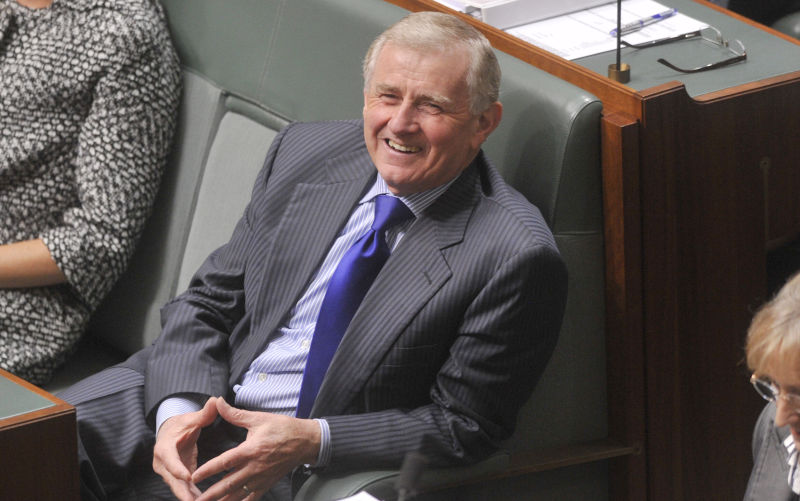He was a creature of workmanlike officialdom, a unionist, a federal Labor opposition leader never allowed to contest an election by the machinations of his own party, but still clear on one gloriously sane point. It takes a lot to oppose the squealing and hollering for war, and the late Simon Crean did that in 2003 in a number of speeches against the illegal invasion of Iraq. Some of these proved to be his finest.
Crean’s position was assumed in a bellicose atmosphere righteous for war. The justification for invading a sovereign country in the Middle East was advanced by such ostensibly great defenders of international law as the United States, the United Kingdom and Australia, with George W. Bush, Tony Blair and John Howard all respectively at the helms. All were keen on finding ways to subvert the United Nations and attack a country supposedly armed to the teeth with Weapons of Mass Destruction (WMDs) it was willing to use on its neighbours. (It’s WMD arsenal, most of it financed by Western states had, at that point, been almost entirely disarmed.)
To aid in this crime of international aggression, intelligence assessments would be either concocted or deliberately misread; fictional ties of cooperation and accommodation between Saddam Hussein and the al-Qaeda network responsible for the September 11, 2001 attacks on the United States would be confected.
In January 2003, Crean addressed some 350 Australian troops on the HMAS Kanimbla already destined for a war that was going to take place, whatever the claims to peace being made in Washington, London or Canberra. “I don’t want to mince my words because I don’t believe that you should be going. I do not believe that there should be a deployment of troops to Iraq ahead of the United Nations determining it.” Notwithstanding his disagreement, he supported the troops “and always will, and that distinction is fundamentally important.”
In his February 5 speech to the Australian Parliament, Crean sharpened the lines of Labor’s position against war. “The statement by the prime minister,” he solemnly declared, “is his argument for war, not a plan for peace. It only took the prime minister until only the second page of his statement to conclude that the only possible outcome is war.”
Prime Minister Howard had “committed Australia’s young men and women to a war not yet declared, knowing all along that you couldn’t pull them out.” It was done “without the mandate of the Australian people, the Australian parliament or the United Nations.” It was a commitment made “solely on the say so of [President] George W. Bush.” All of this had been facilitated without “the courage or conviction to tell [the Australian people]” what had, in fact, been done.
It was an achingly accurate portrait of a subservient leader keen to abide by the wishes of the US imperium, whatever its wisdom and whatever the implications for international peace and security. “You must insist in your discussions with George Bush,” stated Crean to the Prime Minister as he was readying to go to Washington, “that no troops should be sent to war without a UN mandate.” Relevantly, and doffing his cap to international law and treaty obligations, the opposition leader pointed out that the ANZUS Treaty “makes it clear that all alliance decisions must be in conformity with the United Nations.”
With firm clarity, Crean expressed the position that Australian troops should never have been sent ahead of a UN mandate. The weapons inspectors responsible for assessing the status of Iraq’s weapons were “still doing their job and should be given the chance to finish it.” The UN Security Council was the only body with the final authority “to deal with the issue of disarming Iraq.” And all, to what end? The link between Iraq and al-Qaeda, after all, had not been plausibly made. Australia could hardly be said to have a genuine interest in the matter.
Crean’s opposition received a lashing in the war-crazed Murdoch press. “Only one in five Australians would prefer him to be Prime Minister,” crowed the Courier Mail on March 26, 2003, “and the cause of this bleak picture for Mr Crean is the only issue that matters at the moment: the war against Iraq.”
In October 2003, Crean dared tell Bush, then visiting the Australian Parliament, about those necessary disagreements allies and friends can have. “The Australian perspective is bound to differ, from time to time, with the perspective of the United States.” Australia’s commitment to the alliance was “unshakeable”, “but friends must be honest with each other.” It was a view that went down like a lead balloon in the gallery of warmongering enthusiasts.
Pity that the current crop of Australian Labor politicians cannot follow suit in a tradition filled by such acts of courage as Arthur Calwell’s opposition to sending Australian troops to the Vietnam War, Gough Whitlam’s recognition of Mao Zedong’s Communist China in 1971 and the stance taken by Herbert “Doc” Evatt against the efforts of the Menzies government to ban the Australian Communist Party.
Under the Albanese government, Australia readies in lockstep with the United States for war with China under the military umbrella of AUKUS, an eerie resemblance of the pre-emptive nonsense that characterised the attack on Iraq. In place of Saddam Hussein is the wicked figure of President Xi Jinping and his Red-Yellow Hordes. War is seen as a policy of necessary resort to counter upstarts and deviants of the international order – at least as viewed from the perspective of Anglosphere powers. If only a fraction of the sense and sensibility showed by Crean would rub off.
Binoy Kampmark was a Commonwealth Scholar at Selwyn College, Cambridge. He lectures at RMIT University, Melbourne.

